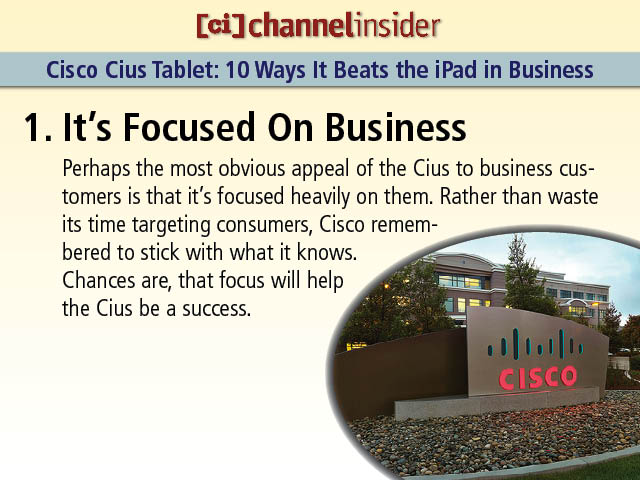 Cisco Cius Tablet 10 Ways It Beats the iPad in Business
Cisco Cius Tablet 10 Ways It Beats the iPad in Business
1. It’s Focused On Business Perhaps the most obvious appeal of the Cius to business customers is that it’s focused heavily on them. Rather than waste its time targeting consumers, Cisco remembered to stick with what it knows. Chances are, that focus will help the Cius be a success.
 No Title
No Title
2. Wireless Networking Galore Unlike the iPad, which only offers 3G wireless connectivity in the iPad 3G, every unit that Cisco ships will include both WiFi and 3G connectivity. As the corporate world continues to change over from a sedentary sector to one that requires mobility, constant access to the Web is a necessity. The iPad version running just WiFi won’t deliver that. But the Cius will give that to corporate — the ability to connect to the Web all the time. Not bad.
 No Title
No Title
3. Go Mobile The Cius is designed for road warriors. The device, with a 7-inch display, weighs just over one pound. That should be ideal for most employees that want a simple computer to bring to a client’s location. Bulky and heavy has little value for most enterprise customers. But Cius is small and lightweight. And it will fit perfectly in any corporate setting.
 No Title
No Title
4. The Cisco Apps Cisco says its many applications, including WebEx and TelePresence, will work with the new Cius tablet. That could be one of the most important elements in the success of the device. Cisco is one of the only firms that already has a significant collaboration software presence in the corporate market. Thanks to that, its apps will likely be used by companies when others are ignored.
 No Title
No Title
5. Android, Anyone? Google has been trying desperately to find a way into the corporate space. It’s software-only approach has forced it to wait until another firm delivered a viable product. It has finally waited long enough. With the Cius, Google can finally show the corporate world that its software can be viable in an enterprise setting. And since Android is also available on smartphones, it might not be long before the company’s mobile operating system works its way into the corporate world in devices like the Droid X.
 No Title
No Title
6. The Anti-iPad The iPad does a fine job of appealing to consumers. But for most business customers looking for functionality and productivity, it falls short. The Cius fill that vacuum because it’s so anti-iPad. It delivers the same kind of functionality that business customers are looking for, but it does so in a product that offers extras business users need. It’s a win-win for Cisco. And it shows just how far off the iPad is for most enterprise customers.
 No Title
No Title
7. Communication Is Key Communication means the difference between success and failure in the corporate world. But unlike the iPad, which is decidedly not a communication platform, the Cius will allow customers to integrate it with existing Cisco telephone products. Users will be able to engage in video conversations from a phone sitting on their desks. What a great idea. For years, companies have been attempting to find ways to make video conferencing more useful. Finally, Cisco has found a way to use a mobile device and make it double as a video-conferencing tool. Pretty neat.
 No Title
No Title
8. More Connectivity The iPad doesn’t offer too many connectivity options. In fact, if users want to plug in a USB product, they need a peripheral, sold separately, to do so. But Cius includes USB ports and Bluetooth connectivity to give users more options. That’s especially important to business customers. Since most folks have several different USB devices hanging around, being able to connect anything they want to the device will be a welcome feature.
 No Title
No Title
9. The Enterprise’s Video The Cius front-facing camera is capable of 720p video recording for those that want to do more with the product than just surf the Web and check e-mail. And its outward-facing camera is capable of snapping 5-megapixel shots and recording video. Considering how important video of all kinds has become to companies, those additions should make most firms happy.
 No Title
No Title
10. It Will Support 4G Although it won’t be available at launch, Cisco has confirmed that the Cius will sport 4G connectivity. That could be a major feature for corporate customers that want to access super-high-speed networks over the coming years. Admittedly, 4G networking isn’t all that important right now. Only the Evo 4G is capable of working with it. But in the next few years, 4G will play a major role in corporate connectivity. And it’s nice to see that Cisco believes in it.

